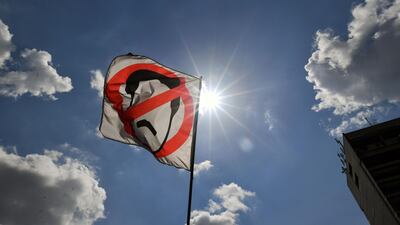Last week's announcement by the Lima Group of Latin American countries that Nicolas Maduro should step aside from the presidency of Venezuela was followed, over the weekend, by US Secretary of State Mike Pompeo's statement that the nation's current regime was "illegitimate". These are powerful and condemnatory words, but entirely justified.
Quite apart from the seriously flawed nature of last year's election, which Mr Maduro won so decisively that the 14 Lima Group countries withdrew their ambassadors from Caracas; and quite apart from his abuses of the country's constitution, such as setting up an illegal Constituent Assembly because he couldn't control the democratically elected National Assembly.
Mr Maduro deserves to go if only because of his sheer incompetence. The litany of economic disasters that have struck Venezuela under his rule has to be spelled out to be believed.
According to The Economist, the country now produces less oil than it did in the 1950s. Three million people have emigrated – that is a full 10 per cent of the population, with more expected to follow. The International Monetary Fund expects inflation to hit 10 million per cent this year. The healthcare system, once a model for the region, is in crisis, while the number of Venezuelans considered to be "undernourished" by the UN rose from five per cent between 2008 and 2013 to nearly 12 per cent in 2018.
The difference between the state of the country under Mr Maduro and his predecessor and mentor, the late Hugo Chavez, is both startling and tragic. Chavez had many critics, on both the right and the left, who considered him authoritarian and illiberal. He may also have been lucky that the price of oil rose pretty consistently during his time in office from 1999 to 2013. This allowed him to create a "socialism that works" – with huge achievements in literacy, poverty reduction, housing and health – that appeared to be a model for left-wingers in South America and beyond. Mr Maduro has not had that kind of wealth at his disposal.
But Chavez was also a genuinely inspirational and charismatic leader, who was elected freely and fairly again and again. Mr Maduro, on the other hand, is an unsophisticated thug who will never have a political ideology named after him as Chazev did, and whose support is draining away as rapidly at home as it is abroad.
He should definitely go. The question is how. Mr Pompeo also said during his visit to Abu Dhabi that “the United States will work diligently to restore a real democracy to that country”. Even those who have been harsh critics of American meddling in the affairs of other countries might concede that this could be one incidence in which US intervention could come in useful. But, given the dark history of US covert operations in the region – including giving the green light to an attempted coup against Mr Chavez – it is crucial that America keeps its involvement to a minimum.
The best result would be for Venezuelans to bring about change themselves, as Filipinos did in the People Power Revolution of 1986. That, however, took a combination of mass demonstrations in Manila, support from key military figures – including the defence minister and chief of police – and the Catholic church. It also involved President Ferdinand Marcos knowing he could flee the country with probable immunity.
The role of the church is unlikely to be so important in Venezuela today, and while the country’s bishops have also declared Mr Maduro’s new term as president to be illegitimate, the Vatican still sent a representative to his inauguration. But are other similar enabling circumstances possible? Juan Guiado, the president of the National Assembly who has said he should be considered the legitimate head of government instead of Mr Maduro, may think so. He has called for mass demonstrations on January 23, the anniversary of the 1958 uprising that overthrew another Venezuelan strongman, Marcos Perez Jimenez.
The brief detention of Mr Guiado on Sunday, about which different members of the Maduro administration made varying and contradictory responses, and the recent departure to the US of a previously loyalist supreme court judge, suggests there are significant cracks in the Maduro regime. What will be important is whether he can count on the continued support of the military. With significant sections of the economy run by retired or active-duty officers, there remains an incentive for the armed forces to prop up the president, even as international recognition ebbs away from him. But as the cake shrinks – Venezuela has effectively lost half of its GDP since 2013 – those financial returns are inexorably diminishing. Russia and China are still friendly. But will that be enough in the face of increasing isolation?
The outside world can and should do everything possible to help bring about change, including conducting talks with sensible figures within the administration and the military. Similarly, the priority must be that there is a transition – worries about transitional justice and whether compromised figures have been included in a caretaker administration can be addressed later. But outside intervention should be ruled out, at least for now. It is far better for Venezuelans to make their own revolution.
Few can doubt it is needed, for it is clear that only further disaster awaits the country under Mr Maduro. The tragedy is that Chavism once offered hope that a left-wing model could raise standards of living and reduce income inequality in developing countries without tanking the economy.
We will never know if its founder could have continued that model successfully. But we do know that the answer under Mr Maduro has been “no”. His time is up. Let us hope the demonstrations this month mark the beginning of Venezuelans reclaiming their prosperity and, most importantly, their liberty that Mr Maduro has tried to crush.
Sholto Byrnes is a Kuala Lumpur-based commentator and consultant and a corresponding fellow of the Erasmus Forum.


